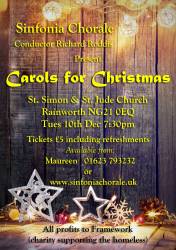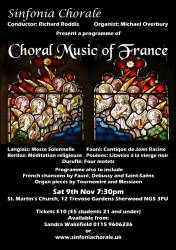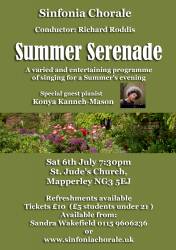Christmas Newsletter 2019
Dear Friends,
Thank you so much to everyone who attended our concert on Saturday 9th November - your support is greatly appreciated and we really hope you enjoyed the French music!
We are now working towards the Christmas concerts, which promise to be very enjoyable occasions and will put us all in a festive mood! Patchings Farm Arts Centre is the venue for the first concert, on Sunday 8th December at 7.30pm. Tickets (available from Patchings only) are £8.50 and include a glass of wine and a mince pie at the interval.
On Tuesday 10th December, at 7.30pm, the concert will be at Rainworth Parish Church (St Simon and St Jude). Tickets, which can be purchased on the website, will be £5.00 and this also includes refreshments. Please come along and join us for some Christmas cheer - audience participation is essential (and free!).
If you enjoy singing with us, why not book onto our Come and Sing Workshop? We’ll be exploring different settings of O Magnum Mysterium on Saturday 18th January 2020, at Christchurch, Chilwell, NG9 4AS. Please visit our website for more details
We look forward to seeing you!
Sinfonia Chorale
Autumn Newsletter 2019
Dear Subscriber,
Autumn is fast approaching and that means one thing - another amazing Sinfonia Chorale concert! Save the date - Saturday November 9th, 7.30pm, at St Martin’s Church, Sherwood, NG5 3FU.
You can look forward to a wonderful selection of French choral music, including the Messe Solennelle by Langlais, Duruflé’s Four Motets and also French chansons by Fauré, Debussy and Saint-Saëns. In addition, you will have the great opportunity to hear organ pieces by Tournemire and Messiaen, expertly played by the renowned Michael Overbury.
Interestingly, Jean Langlais (1907-1991) studied improvisation with Charles Tournemire (around 1930) and later, in 1945, he became the successor to Cesar Franck and Tournemire at the organ tribune of Saint-Clotilde in Paris, only leaving the position in 1987.
Being blind from the age of 2, Langlais attended the Paris National Institute for the Young Blind (where he later worked as a professor for 40 years) and then he went on to the Paris National Conservatory of Music. He was a prolific composer of organ, vocal and instrumental music, and gave hundreds of recitals. The Messe Solennelle is a powerful, complex piece, combining thundering, and also intricate, organ passages with striking, colourful vocal sections, sometimes dissonant, sometimes very melodic.
In contrast, Maurice Duruflé’s (1902-1986) Four Sacred Motets (1960), based on Gregorian themes, are for unaccompanied voices and set Latin texts for different liturgical occasions. These beautiful motets have been described as ‘rich in subtle harmonies, well-written for voices, and reminiscent of impressionism’. They evoke a quiet, spiritual feeling, inspiring contemplation. Duruflé also had organ lessons with Tournemire.
We will also be performing one of the three movements from Tristia (Opus 18) by Hector Berlioz (1803-1869). The individual movements were published together as a whole in 1852, but were never performed during Berlioz’s lifetime. Meditation Religieuse (1831), the movement which we will present, is a setting of an English poem by Thomas Moore, translated into French by Louise Belloc. Berlioz uses contrasting dynamics and sustained harmonies to reflect a picture of the world as a ‘fleeting show’, with Heaven being the only true thing.
We hope that this has whetted your appetite for some delightful French music. It would be wonderful to see you on November 9th
Please visit our website to purchase tickets (£10), or call Sandra Wakefield on 0115 960 6236.
Best wishes to you all!
Sinfonia Chorale
Summer Newsletter 2019

Hello to everyone on this summery day!
We have a treat in store for you on Saturday 6th July, 7.30pm at St Jude’s Church, Mapperley, NG3 5EJ! The wonderfully talented pianist, Konya Kanneh-Mason, will be our guest soloist and we are very excited about this! She holds the Gilling Family Scholarship at The Royal Academy of Music, studying piano with Tessa Nicholson. In 2017 she won Nottingham Young Musician and was joint winner of the Carlton MVC Music Makers Award in 2018. She plays solo recitals and also with her siblings (you may have heard of some of them!) and is also a member of the Chineke! Orchestra. On the 6th July, Konya will be delighting us all with pieces (although these may be subject to change…) such as the challenging and lively Waltz in A-flat major, Op. 42 by Chopin, as well as his Nocturne in B major, Op. 32, No. 1. There might also be some movements from Beethoven’s Tempest Sonata… you will definitely have to come along to find out!
The choir will also be performing a varied programme of music, from The Making of the Drum by Bob Chilcott to Thomas Tomkins’ lively madrigal, See, See the Shepherds’ Queen. There will also be some English romantic partsongs, such as Come Live with Me by William Sterndale Bennett and a delicious Whitacre piece called A Boy and a Girl, which is a setting of a translation of a poem by Octavio Paz.
Chilcott set the evocative, striking poems of Edward Kamau Braithwaite for his colourful creation, celebrating the way in which the spirit of the drum is brought to life, from sacrificing the goat, to cutting the tree and sounding the drum. Complex rhythms, vocal effects and the actual use of percussion instruments are effectively combined to make an exciting, unusual piece.
Tickets are £10 (£5 for students under 21) and are available from Sandra Wakefield 0115 9606236 or from the Sinfonia Chorale website.
It promises to be a lovely evening and we look forward to seeing you!
Thank you so much for your continued support,
Sinfonia Chorale
Spring Newsletter 2019

Dear Friends
It’s hard to believe that our first concert of 2019 is nearly here - and what a lovely event it promises to be!
We are very lucky to be performing with Nicolette Moonen and her talented Baroque Ensemble, which will include trumpets, as well as woodwind and strings.
Nicolette is a renowned Baroque violinist and the artistic director of The Bach Players. She teaches at the Royal Academy of Music in London and has performed with most of the country’s leading period instrument ensembles. Our March concert will be a wonderful opportunity to hear and experience the rich music of J.S. Bach and Jan Dismas Zelenka expertly played on period instruments. The combined expertise and sensitivity of Richard Roddis and Nicolette Moonen brings the music to life, adding nuance, emotion and depth - all of which promises to make a memorable concert!
Our two main pieces are Bach’s Ascension Oratorio and Zelenka’s Missa Gratias agimus tibi. Zelenka and Bach did meet and held each other in high esteem. Born in 1679, Zelenka (referred to as Bach’s Catholic counterpart) was a Czech Baroque composer whose instrument was the bass viol (violone). In 1709 he served Baron von Johann Hubert von Hartig and had access to his extensive music library. He then became a player in the royal orchestra at Dresden in 1710 and remained here until his death in 1745. He was a very highly paid, and respected, musician who created beautiful sacred music for the Catholic court church. He occupied the position of Kapellmeister for several years (in an unofficial capacity) following the death of Johann David Heinichen. This position was subsequently given to the composer Johann Adolf Hasse in 1731. Zelenka held the official position of church composer from 1734, a position that J.S. Bach also held from 1736 after composing a mass for the Dresden court which eventually persuaded Augustus III to give him this title. Leipzig and Dresden were both in the Electorate of Saxony at this time.
As far as is known, Zelenka composed 249 works, including over 20 masses, oratorios, requiems, litanies and some purely instrumental pieces. He was very aware of different types of music from around Europe and could effectively compose using many musical styles, such as fugues, operatic arias, dances and folk music. The Missa Gratias agimus tibi (1730) is very enjoyable to perform, full of contrapuntal elaborateness, harmonic surprises and long phrases reflecting a variety of musical and emotional ideas. There is rich variety throughout the piece, ranging from florid, exciting passages to more intense, slower, atmospheric parts.
Johann Sebastian Bach (1685 - 1750) is now considered to be one of the greatest and most prolific composers ever, in addition to being a virtuoso organist, keyboard player and talented violinist. In 1723 he became the Thomaskantor at the St Thomas Church (Lutheran) in Leipzig - a position he held until his death. The beautiful Ascension Oratorio (also known as Lobet Gott in Seinen Reichen BMV 11, or Himmelfahrts-Oratorium was probably composed (and definitely performed) in 1735 for the service for Ascension. Chorales, biblical sources and free poetry are used for the text and the structure comprises 11 movements in 2 parts, showing symmetry around a central chorale (written by Johann Rist). It is richly scored for 4 voice parts, trumpets, timpani, oboes, strings, continuo and flauti traversi. Some sections were newly composed and some based on earlier compositions. A festive, joyous and reflective piece, full of musical variety and intensity, it opens with a dancelike chorus and finishes with an impressive chorale fantasia, expressing the longing for the day of union with Jesus in Heaven.
If you would like to hear these lovely works, please join us on Saturday 16th March at Beeston Parish Church, Nottingham, NG9 1GA, at 7.30pm. Ticket details are on our website or please ring Sandra Wakefield on 0115 9606236.
We look forward to seeing you!
Best wishes,





